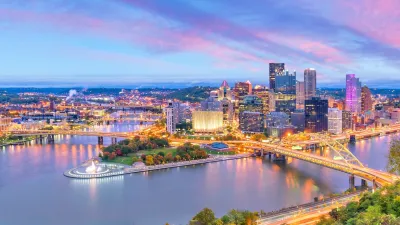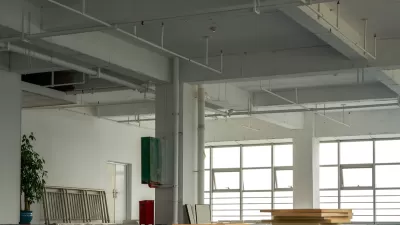The program complements an existing residential conversion initiative and could yield up to 2.5 million square feet of new commercial space.

A new program in Washington, D.C. encourages the adaptive reuse of downtown office buildings into almost any other business, with the program itself dubbed “Office to Anything” (but officially known as Central Washington Activation Projects Temporary Tax Abatement), reports Ida Domingo for ABC 7 News.
The program is aimed specifically at non-residential uses such as hotels, retail, entertainment, or other uses, acknowledging that residential conversions, which are supported by the 2024 Housing in Downtown program, are not possible for every building. In announcing the program, Mayor Muriel Bowser said, “Through Office to Anything, we will transform vacant and underutilized offices into new, productive uses that increase foot traffic, generate economic activity and tax revenue, and bring new vibrancy to DC’s commercial core.”
The program offers a 15-year property tax freeze and could impact up to 2.5 million square feet of underused office space. “Officials said the value of the total tax abatements available is subject to a cap of $5 million for 2027, $6 million for 2028, and $8 million for 2029, with 4% growth each year after.”
FULL STORY: Office to Anything': DC launches program to turn empty offices into new businesses

Alabama: Trump Terminates Settlements for Black Communities Harmed By Raw Sewage
Trump deemed the landmark civil rights agreement “illegal DEI and environmental justice policy.”

Planetizen Federal Action Tracker
A weekly monitor of how Trump’s orders and actions are impacting planners and planning in America.

The 120 Year Old Tiny Home Villages That Sheltered San Francisco’s Earthquake Refugees
More than a century ago, San Francisco mobilized to house thousands of residents displaced by the 1906 earthquake. Could their strategy offer a model for the present?

LA’s Tree Emergency Goes Beyond Vandalism
After a vandal destroyed dozens of downtown LA trees, Mayor Karen Bass vowed to replace them. Days later, she slashed the city’s tree budget.

Sacramento Leads Nation With Bus-Mounted Bike Lane Enforcement Cameras
The city is the first to use its bus-mounted traffic enforcement system to cite drivers who park or drive in bike lanes.

Seattle Voters Approve Social Housing Referendum
Voters approved a corporate tax to fund the city’s housing authority despite an opposition campaign funded by Amazon and Microsoft.
Urban Design for Planners 1: Software Tools
This six-course series explores essential urban design concepts using open source software and equips planners with the tools they need to participate fully in the urban design process.
Planning for Universal Design
Learn the tools for implementing Universal Design in planning regulations.
Ada County Highway District
Clanton & Associates, Inc.
Jessamine County Fiscal Court
Institute for Housing and Urban Development Studies (IHS)
City of Grandview
Harvard GSD Executive Education
Toledo-Lucas County Plan Commissions
Salt Lake City
NYU Wagner Graduate School of Public Service





























